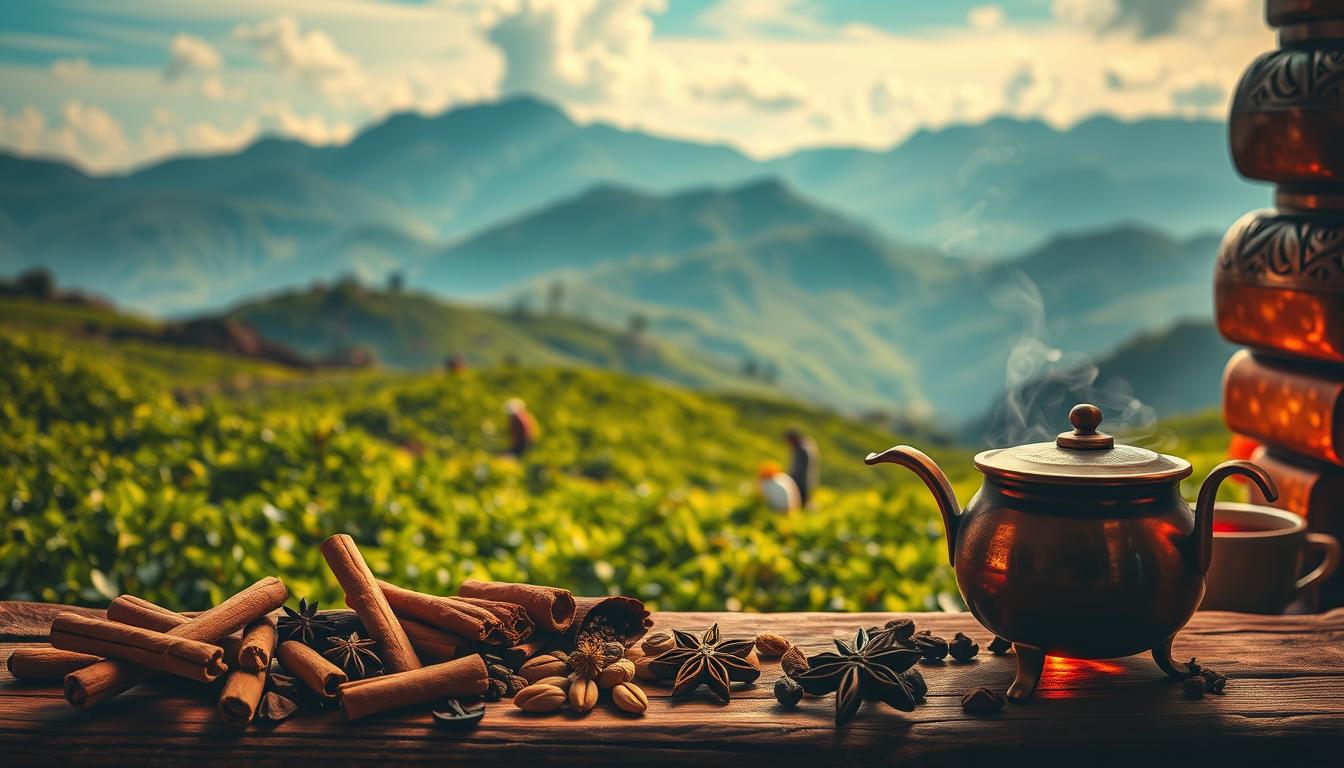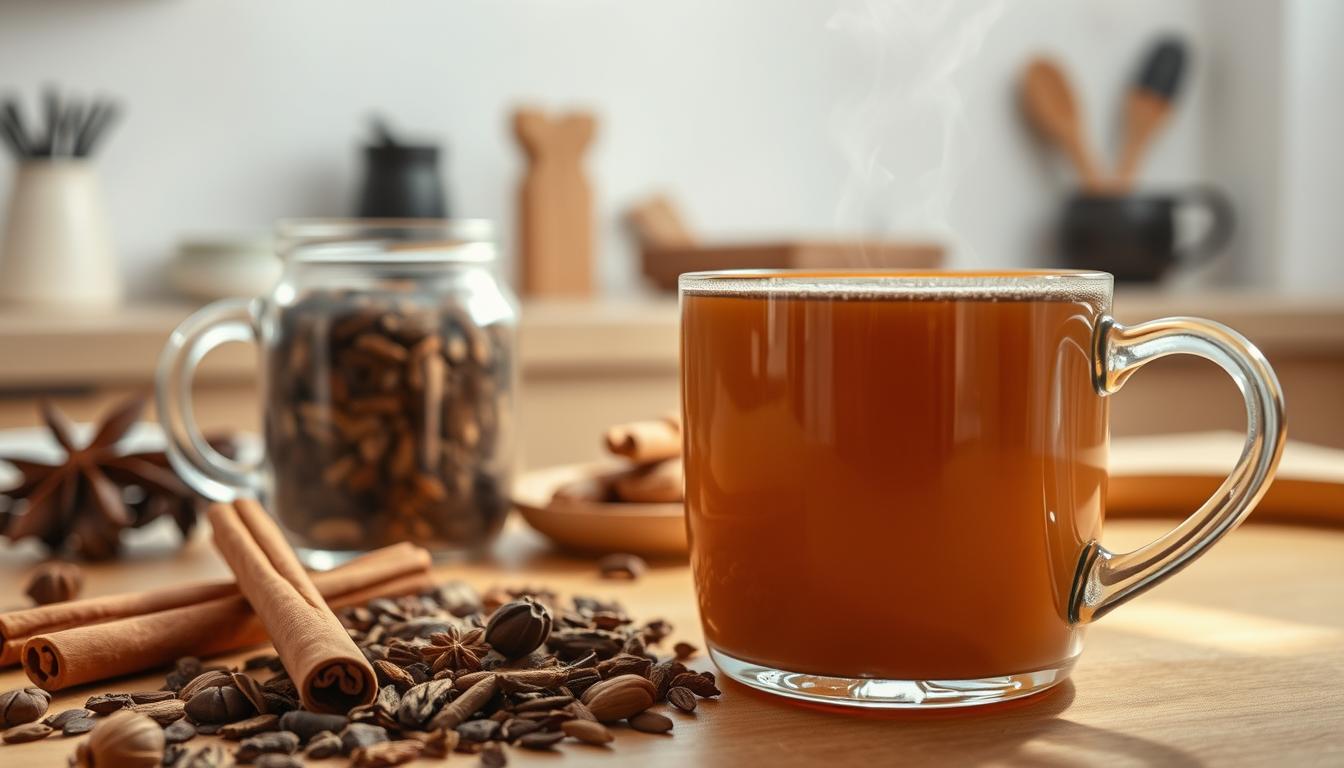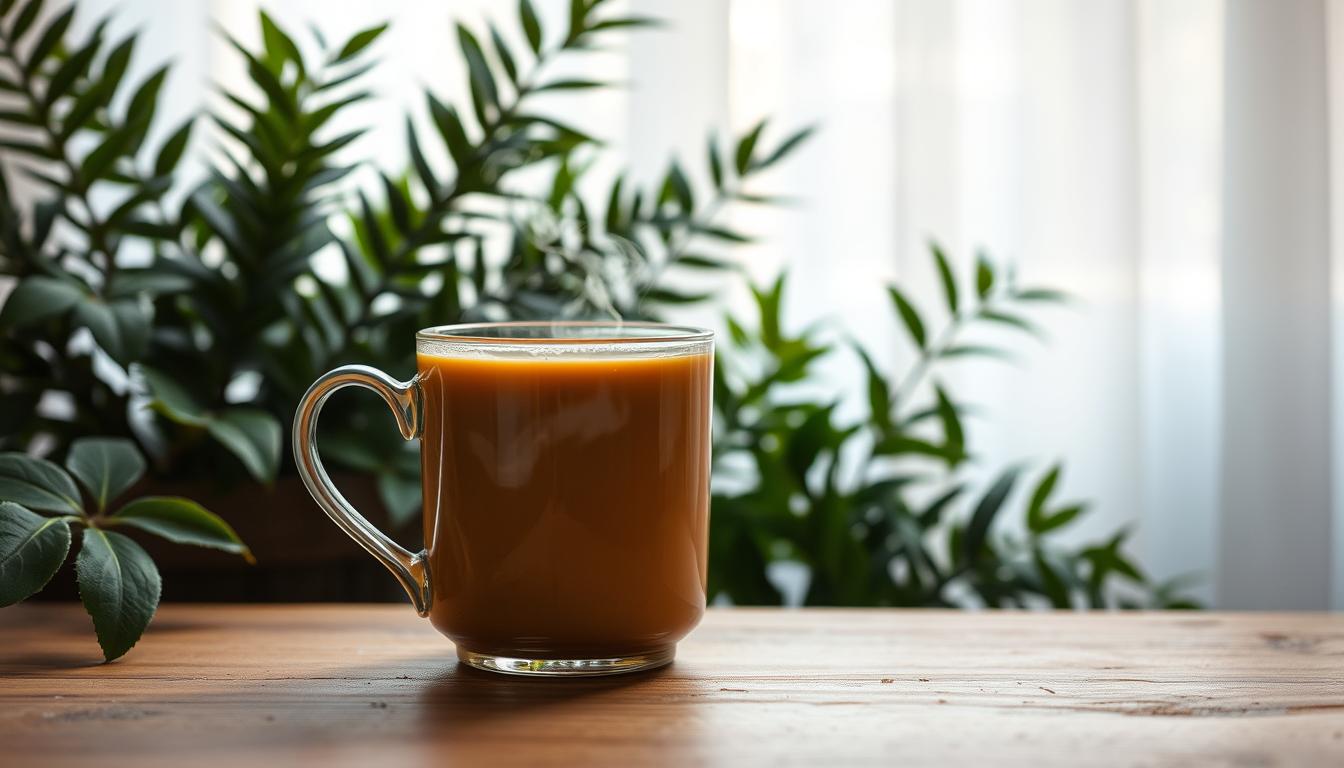Did you know that over 80% of pregnant women rethink their beverage choices to ensure their baby’s health? One popular drink that often sparks questions is chai tea. Loved globally for its rich blend of black tea, milk, and aromatic spices, it’s a comforting choice for many. But when expecting, every sip matters.
Chai tea offers antioxidants and soothing properties, thanks to its unique spice mix. However, its caffeine content requires careful attention. Experts recommend limiting caffeine intake to 200 mg per day during this critical time. This article explores the benefits and potential risks, helping you make informed decisions.
Moderation is key. For those sensitive to caffeine or spices, we’ll also discuss alternative options. Let’s dive into the details to ensure you can enjoy your favorite drink while prioritizing your health and your baby’s well-being.
Key Takeaways
- Chai tea contains caffeine, which should be monitored during pregnancy.
- Its blend of spices offers antioxidants and soothing benefits.
- Experts recommend limiting caffeine to 200 mg per day.
- Moderation is essential for safe consumption.
- Alternative options are available for those sensitive to ingredients.
Understanding Chai Tea: Origins and Variations
Rooted in Indian culture, chai tea has evolved into a global favorite. Known as masala chai in its homeland, this beverage combines black tea with a blend of aromatic spices and milk. Its comforting warmth and rich flavor have made it a staple in households worldwide.

What is Traditional Chai Tea?
Traditional chai tea starts with black tea, infused with spices like cinnamon, cardamom, ginger, and cloves. These ingredients not only enhance flavor but also offer potential health benefits. For example, ginger is celebrated for its soothing properties, making it a popular choice for many.
Milk is often added to create a creamy texture, balancing the boldness of the spices. This classic preparation has been cherished for generations, providing both comfort and nourishment.
Exploring Global Variations
As chai tea traveled across borders, it adapted to local tastes and preferences. In the U.S., for instance, iced chai has become a refreshing alternative to the hot version. Herbal chai, made without black tea, offers a caffeine-free option for those monitoring their intake.
Here’s a quick comparison of traditional and global variations:
| Type | Key Ingredients | Unique Feature |
|---|---|---|
| Traditional Chai | Black tea, milk, spices | Warm and creamy |
| Herbal Chai | Herbal base, spices | Caffeine-free |
| Iced Chai | Black tea, milk, spices, ice | Refreshing and cool |
For pregnant women, understanding these variations is crucial. Herbal chai, for example, can be a safer choice due to its lack of caffeine. Always consider the ingredients and their effects when selecting your brew.
“Chai tea’s versatility allows it to cater to diverse preferences, making it a beloved drink across cultures.”
Whether you prefer the traditional recipe or a modern twist, chai tea offers something for everyone. Its rich history and adaptability ensure it remains a timeless favorite.
Nutritional Benefits and Potential Risks
Many expecting mothers wonder about the nutritional value of their favorite drinks. This beverage offers a unique blend of spices that provide both flavor and health benefits. Let’s explore what makes it a popular choice and what to watch out for.

Health Benefits for Expecting Mothers
The spices in this drink, like ginger and cinnamon, are packed with antioxidants. These help fight free radicals and support overall health. Ginger, in particular, is known to soothe nausea, a common issue for many pregnant women.
Cardamom and cinnamon also aid digestion and may boost heart health. Together, these ingredients create a benefit-rich beverage that’s both comforting and nutritious.
Recognizing Risk Factors
While the spices offer benefits, the caffeine content requires attention. Compared to coffee, this drink has a milder amount caffeine, making it a safer choice. However, exceeding the recommended amount of 200 mg per day can lead to risks like low birth weight.
Moderation is key. Pay attention to the amount consumed daily and consider caffeine-free options if needed. Natural herbs in the blend can enhance its benefits, but understanding their effects is vital.
“Balancing the benefits and risks ensures a healthier choice for both mother and baby.”
By being mindful of ingredients and intake, expecting mothers can enjoy this beverage while prioritizing their well-being. The next section will dive deeper into expert guidance for making the best choices.
is chai tea safe during pregnancy
Navigating beverage choices while expecting can feel overwhelming, especially with so many options to consider. One common question is whether this spiced drink fits into a healthy routine. Let’s break down the key factors to help you make an informed decision.
Caffeine and Spice Considerations
The caffeine content in this drink is lower than coffee, but it still requires attention. Experts suggest keeping daily caffeine intake under 200 mg to avoid potential risks. This ensures both you and your baby stay healthy.
Spices like ginger and cinnamon can help with nausea, a common issue for many expecting mothers. Ginger, in particular, is known for its soothing properties. However, it’s essential to monitor how your body reacts to these ingredients.
Expert Guidance and Healthcare Advice
Healthcare providers often recommend moderation. Even small amounts of caffeine from black tea can cross the placenta, so timing and total caffeine intake matter. Reading labels and calculating your daily consumption can help you stay within safe limits.
If you’re sensitive to caffeine or spices, consider decaffeinated options. These alternatives allow you to enjoy the flavor without the risks. Always consult your doctor for personalized advice.
“Moderation and mindfulness are key to enjoying your favorite drinks while prioritizing your health and your baby’s well-being.”
By understanding the ingredients and their effects, you can make choices that support a healthy pregnancy. Enjoying this drink in moderation can be part of a balanced routine when prepared thoughtfully.
Pregnancy-Safe Tea Alternatives and Preparation Tips
Finding the right drink to enjoy during this special time doesn’t have to be complicated. With a variety of options available, you can still savor comforting flavors while prioritizing your health and your baby’s well-being. Let’s explore some alternatives and tips to make your experience both safe and enjoyable.
Decaffeinated and Herbal Options
For those monitoring their caffeine content, decaffeinated and herbal blends are excellent choices. These options allow you to enjoy the rich flavors without the risks associated with caffeine. Herbal blends, in particular, often include spices like cinnamon and ginger, which can provide soothing benefits.
When selecting a blend, always check the label to ensure it’s caffeine-free. Some herbal teas are specifically formulated for expecting mothers, offering a safe and nourishing option. A cup of these blends per day can be a comforting addition to your routine.
DIY Chai Tea Recipes
Creating your own blend at home gives you full control over the ingredients. Start with a base of decaffeinated black tea or an herbal alternative. Add spices like cinnamon, cardamom, and ginger for flavor and health benefits.
Use pasteurized milk to ensure safety and creaminess. Adjust the amount of spices and milk to suit your taste. Here’s a simple recipe to try:
- 1 cup of water
- 1 cup of pasteurized milk
- 1 decaffeinated tea bag or herbal base
- 1/2 teaspoon of cinnamon
- 1/4 teaspoon of ginger
Boil the water, add the spices, and steep the tea. Mix in the milk and enjoy warm or chilled. This customizable approach ensures a pregnancy-safe experience.
“Experimenting with ingredients allows you to create a drink that’s both safe and satisfying.”
By choosing the right alternatives and preparing your blends thoughtfully, you can enjoy a comforting cup of tea per day. Prioritize quality ingredients and moderation to make the most of this nourishing experience.
Best Practices for Enjoying Tea During Pregnancy
Enjoying a warm beverage can be comforting, but during pregnancy, it’s essential to make informed choices. By following a few simple guidelines, you can savor your favorite drink while prioritizing your health and your baby’s well-being.
Moderation and Caffeine Limit Guidelines
Moderation is key when it comes to consuming beverages with caffeine. Experts recommend limiting your caffeine per day to 200 mg. This ensures you stay within safe limits while still enjoying a flavorful drink.
Pay attention to the content of each cup. Spices like cardamom and cinnamon are generally safe when consumed in moderation. They add flavor and can even offer health benefits, such as aiding digestion.
Reading Labels and Customizing Your Brew
Always read labels carefully to understand the exact content of your drink. Look for details on caffeine levels and ingredient lists. This helps you make informed choices and avoid unnecessary additives.
Customizing your brew at home allows you to control what goes into your cup. Use decaffeinated options or herbal bases to reduce caffeine intake. Add spices like cardamom for flavor and warmth.
“Consulting your healthcare provider ensures your choices align with your dietary needs and support a healthy pregnancy.”
By understanding the content of each cup and adjusting ingredient ratios, you can enjoy a flavorful beverage while minimizing risks. These practices make it possible to include your favorite drink as part of a balanced routine.
Conclusion
Making informed beverage choices is essential for expecting mothers. This article highlights that drinks which contain caffeine can be enjoyed in moderation. By adhering to the recommended limit caffeine intake of 200 mg per day, you can minimize any potential effect on your health or your baby’s well-being.
Consulting a trusted healthcare provider is always a smart step. They can address any concern and provide personalized advice tailored to your needs. This ensures your choices align with your dietary requirements during caffeine intake pregnancy.
Remember, moderation is key. Whether you choose traditional blends or alternatives, thoughtful ingredient selection and monitoring daily consumption are vital. This article aims to empower you with the knowledge to make confident decisions.
Enjoy your favorite beverages responsibly, and always stay informed through reputable sources. Your health and your baby’s well-being are worth every thoughtful choice.

